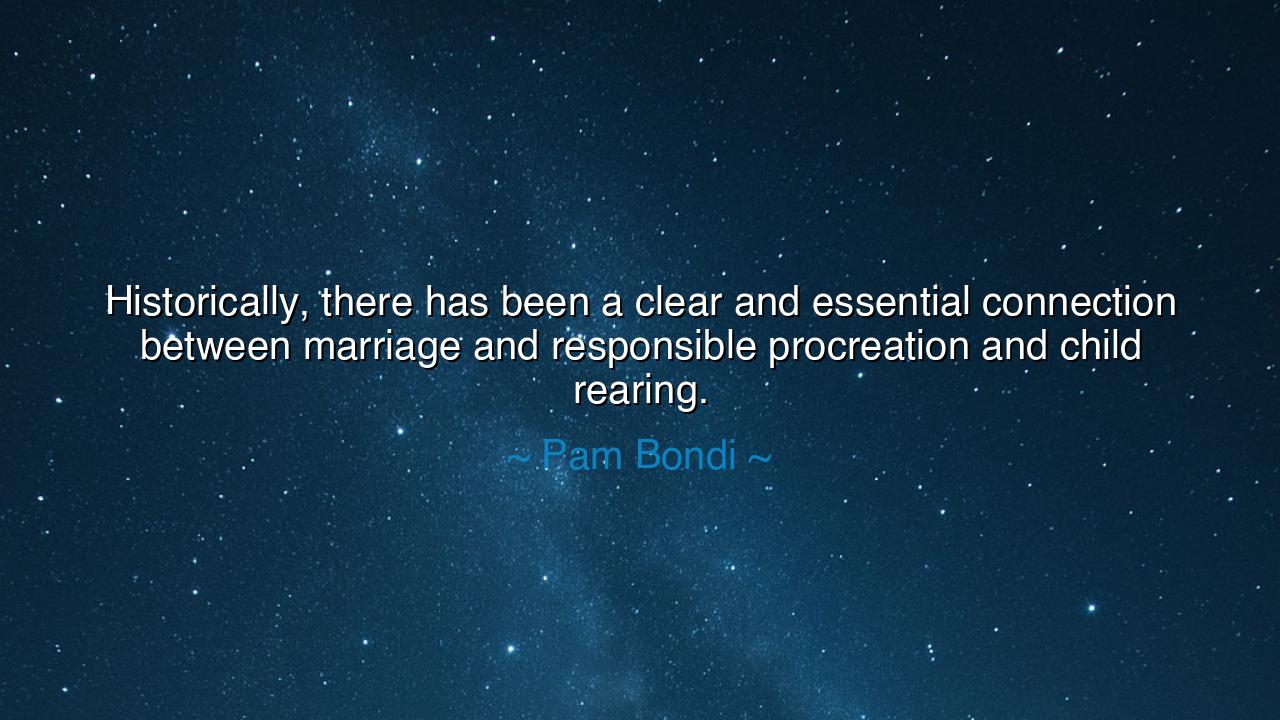
Historically, there has been a clear and essential connection
Historically, there has been a clear and essential connection between marriage and responsible procreation and child rearing.






Hear, O listener, the words of Pam Bondi, who declared with conviction: “Historically, there has been a clear and essential connection between marriage and responsible procreation and child rearing.” In this saying lies a recognition of how, across the centuries, human societies have bound together the sacred duties of marriage, the gift of procreation, and the noble work of raising children. Though customs have shifted and laws have evolved, the thread she names is ancient: marriage has often stood not only as a bond of affection but as the vessel through which life is brought forth and nurtured.
From the earliest days, tribes and nations saw that children are both the blessing and the burden of the future. To ensure their survival, they bound men and women in covenant, making them jointly responsible for the young who would inherit the land, carry on the traditions, and defend the tribe. Thus, the connection between marriage and child rearing was not merely romantic, but deeply practical—a safeguard for stability, inheritance, and the continuity of society.
Consider the story of Sparta, that warrior state of ancient Greece. There, marriage was not only about love, but about producing strong sons to fight in war and strong daughters to bear the next generation. The union of husband and wife was seen as a duty owed not just to one another but to the polis itself. In Sparta’s example, we see how closely societies tied the act of marriage to the responsibility of procreation and the survival of the community.
Yet marriage has always carried more than duty; it has also been the cradle of responsible parenting. When parents commit to one another, they create a foundation upon which children may grow in safety and stability. The family becomes the first school, the first temple, the first government a child encounters. Here the young learn trust, discipline, compassion, and identity. In this way, marriage was seen as a shield—guarding the child not only with food and shelter, but with the guiding hand of stability.
Bondi’s words, however, remind us of history, not of absolutes. In truth, children have been raised in many contexts—by single parents, by extended families, by communities—and yet they, too, have flourished. The meaning of marriage has broadened in our time, stretching beyond the boundaries of procreation alone, embracing companionship, equality, and love as well. Yet her point remains: the historical foundation of marriage was often tied directly to ensuring the next generation’s welfare, binding adult responsibility to the care of the young.
O children of tomorrow, the lesson is not to cling blindly to the past, but to honor its wisdom. Know that the raising of children is not a light matter, but the most sacred of trusts. Whether through marriage or other forms of commitment, the charge is the same: to nurture, to protect, to guide. The ancient bond between love, family, and the continuation of life should not be forgotten, even as societies adapt and evolve.
What then must you do? If you choose marriage, let it be a covenant not only of passion but of responsibility. If you are blessed with children, raise them not in neglect but with deliberate care, knowing they are the seed of the future. And if you do not walk the path of marriage or parenthood, honor those who do, and support the children of your community, for they belong to us all. In this way, the wisdom of the past is carried forward, not as a chain to bind, but as a torch to illuminate the path of responsibility, love, and the eternal bond between generations.
Thus, Bondi’s words stand as a reminder: marriage, through history, has been more than union—it has been a sacred trust, joining the power of creation with the duty of raising the young. Let this truth inspire you to cherish both love and responsibility, for in these together rests the hope of tomorrow.






AAdministratorAdministrator
Welcome, honored guests. Please leave a comment, we will respond soon